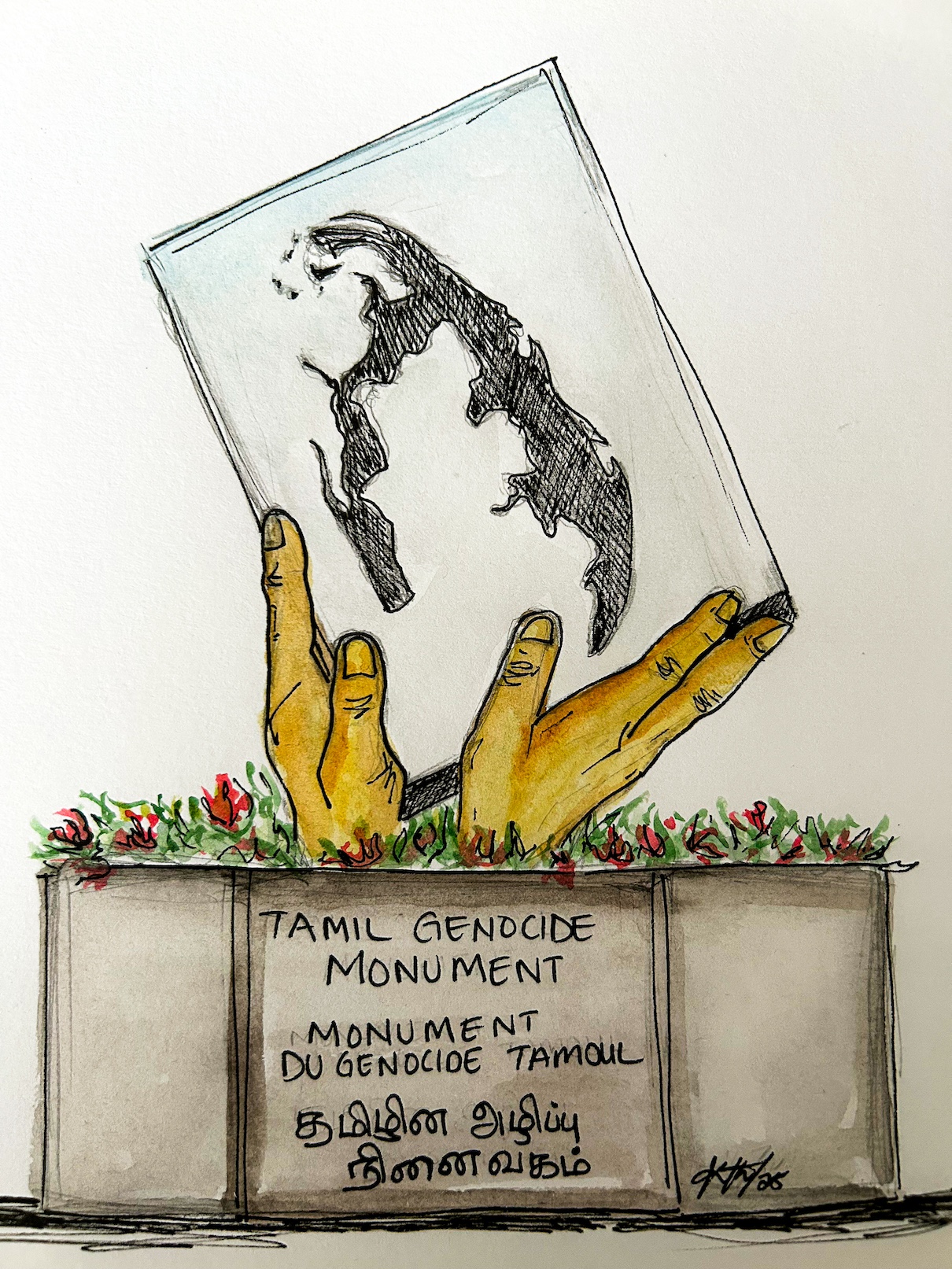Today, Tamils around the world are commemorating 16 years since the massacres at Mullivaikkal. Though more than a decade-and-half has passed, the situation on the island for Eelam Tamils seems as precarious as ever. There has been no accountability for the atrocities that took place. The seizure of historic Tamil land has continued unabated. And an enduring political solution that will finally end the decades of ethnic strife seems further away than ever. The underlying conditions that led to the Tamil liberation struggle remain unaddressed and are festering.
This year’s commemorations come under the shadow of a government elected on promises of change. The National People’s Power (NPP) coalition, which took office just over seven months ago, positioned itself as a break from the establishment: a progressive, anti-corruption force that would steer the island toward accountability, transparency, and a new political culture.
None of that has materialised. The ambiguous pledges that once allowed the NPP to straddle Sinhala, Tamil and Muslim constituencies are rapidly unravelling – as the latest set of local election results have shown. Instead of bold reforms, we have only seen continuity masked as change.
On the economy, the NPP’s policy mirrors that of Ranil Wickremesinghe, marked by strict adherence to IMF diktats and a wholehearted embrace of New Delhi. The Sinhalisation policy is that of Gotabaya Rajapaksa, with Buddhist monks and the military running amok with the construction of viharas and stupas across the North-East. And the absolute denial that the Tamil national question exists at all, instead framing any grievances in vague terms of “equal rights for all Sri Lankans”, echoes that of Mahinda Rajapaksa.
Is Anura Kumara Dissanayake any different to his predecessors?
Indeed, whilst his coalition preaches equality in its words, its actions belie them entirely. Almost eight months in, it is clear that this not due to naivety or inexperience. With the largest parliamentary majority in Sri Lankan history and a fractured opposition, the NPP cannot hide behind excuses of political paralysis. If anything, it possesses a window of opportunity to enact serious change. If the government wished to initiate a serious reckoning with the past, or even begin a conversation about power-sharing, it has had every opportunity to do so. That it has chosen instead to follow the chauvinistic path of its predecessors is not an accident. It is a deliberate and calculated choice.
The latest example of this came last week, when Canada unveiled a Tamil Genocide Monument in Brampton, a powerful act of memorialisation welcomed by survivors, families, and human rights advocates across the globe. The inauguration thousands of miles away presented an opportunity for Sri Lankans to reflect on why such a monument does not exist on the island, and on the lack of justice for the atrocities that took place. It was yet another chance for the NPP to practise what it preaches, when it claims to present an alternative politics for the Tamil people. But the foreign minister decided instead to summon the Canadian High Commissioner and repeat the same tired denials that have echoed through Colombo’s corridors for over a decade. Genocide denial, once the hallmark of Rajapaksa diplomacy, now carries the NPP’s seal. This is a government unwilling to reckon with the past, and increasingly eager to defend a narrative shaped by denial, impunity, and majoritarianism.
Whilst Colombo retreats into erasure, the Tamil nation stands undeterred. In the North-East and across the diaspora, Mullivaikkal commemorations have grown in scale and significance. Rituals such as the distribution of kanji have become symbols of resistance, and the recognition of the genocide is growing in cities around the world. What unites these commemorations is not only grief for the dead, but a universal understanding that what occurred in 2009 was a systematic campaign against a people. It was not simply the tragic byproduct of war. It constituted genocide. And that the conditions which enabled it - militarisation, colonisation, discrimination and impunity - remain unchanged.
The Tamil nation is also cognizant of the changing nature of the world today. They were not the first peoples to be massacred in plain sight of the entire world, and sadly, are not the last. The international community, which watched the catastrophe unfold in 2009, has clearly not reckoned with its own failures, as the events in Gaza demonstrate. International law did not stop the genocide at Mullivaikkal and international justice has failed to account for it.
But their voices have not been silenced. As the nation reflects on its immense loss today, from the ashes of genocide, the call for Tamil self-determination has moved beyond protests on the streets to firm advocacy within the corridors of power. It is the unwavering resilience of the Tamil nation that has carried this demand forward. That resilience will not be extinguished.

